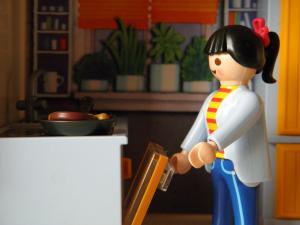
Since having our first child, my husband and I have agreed that I would stay home to be as fully present as possible with our children in their formative years. Although I have, at times, taken on part-time side jobs that could be performed at home to supplement my husband’s income, my primary occupation and vocation has been as a homemaker, and I am not ashamed to say it. I have been a stay-at-home mother for almost sixteen years, and, although I have had my difficult periods and moments of doubt, I wouldn’t change the path we have chosen. When I did face doubts and disillusionment, I remembered to remind myself that I would never regret the time spent with my children, and this helped me to remain steadfast and continue on.
Being a homemaker takes courage in this day and age due to the scorn and stigma we face from the culture, which devalues women who choose to stay home and not pursue a full-time career. An article by By Carrie Gress and Noelle Mering in The Federalist entiteld ‘Why Women Love the Home But Not Being a Homemaker‘ examines why society discredits the vocation of stay-at-home motherhood and fails to recognize the value of forming children and caring for the home, and the satisfaction which can come from it. The article explores how people find vocational happiness, and it determines that many women shy away from homemaking and do not embrace this option for three main reasons.
First, because homemakers often do not receive adequate encouragement in their vocation, they often feel alone and unsupported. In my current situation, I am one of a very few mothers in our school community who is a homemaker working from home. Freelance writing and blogging allow me to remain home with my children while still providing some income for the family. One of the challenges I face is a lack of a supportive network of mothers, since many are working full-time outside of the home. Homeschooling one of our children has provided some support, however, since we became members of the local homeschool group and I have developed friendships with other mothers who also stay home during the day.
Secondly, Gress and Mering explain that society does not recognize the importance of the role of mothers in forming and raising children, and this is due to the messages which have been advocated by radical feminism. The authors state that fifty years of research, however, show that children need their parents to grow and mature into healthy adulthood. Homemaking is a school of love that is necessary for the proper development of children and the transmission of Christian values.
Lastly, the article examines how, due to increased automation and convenience, the work left for stay-at-home mothers is often mindless and routine, which can be frustrating and dissatisfying for women. It concludes that “the happiest women are those who are home with their children, but who have some kind of work that they do part time outside the home,” based on studies by University of Virginia sociologist Bradford Wilcox. This has proven to be accurate in our situation, as the flexibility of my work allows me to continue to be home and available to our children the majority of the time while still enjoying the benefits of having an occupation. Working at home part time and being a homemaker allows me the freedom to pick the children up from school when they are sick and to be home for them after school. So often, our children need mom to give them Tylenol or apply a band-aid, to help with school work or homework, or just to provide a listening ear after a difficult day, and being a homemaker allows me to fulfill those tasks for my children. I am also able to cook meals during the day and have them ready for the family, and also to take care of other chores such as laundry, cleaning, etc. Although these aren’t the most glamorous jobs in the world, they are necessary, and writing provides me with an interesting and creative outlet to relieve some of the tedium.
According to Dr. Gress, there is also an anti-Marian spirit in the world which also contributes to the devaluing of homemaking. Mary was a stay-at-home wife and mother, and also a virgin, and these titles are often not encouraged or applauded in society today. The modern woman is not encouraged to imitate or follow the way of gentleness, humility, and virtue that characterizes Our Lady. However, women are more unhappy than ever when they pursue money, status and power in place of the Marian virtues.
The call to be a homemaker is a valuable and legitimate vocation, worthy of recognition and appreciation. Although many women must work to make ends meet, they too can embrace the duties of homemaking and find an appreciation for and joy in them at the times when they are home. Mothers who stay home, and those who work, are forming and molding souls and preparing their children to face the world by instilling in them responsibility and values. Hopefully, there will be a trend back to appreciating the work of homemaker and that women will begin to rediscover the beauty and importance caring for the family and the home.












